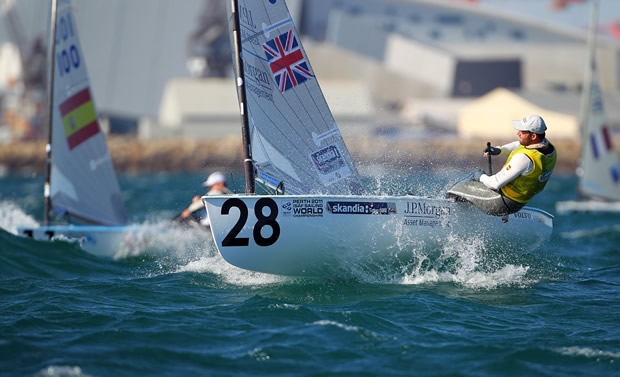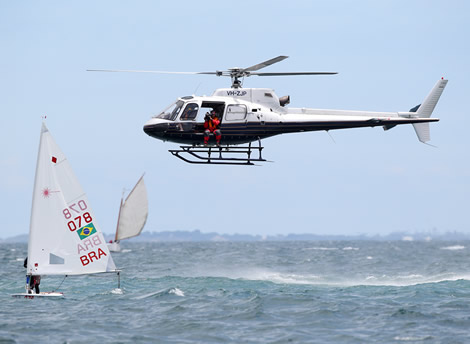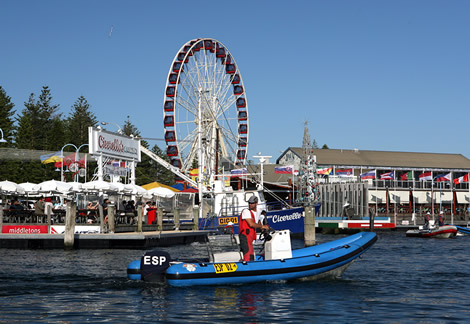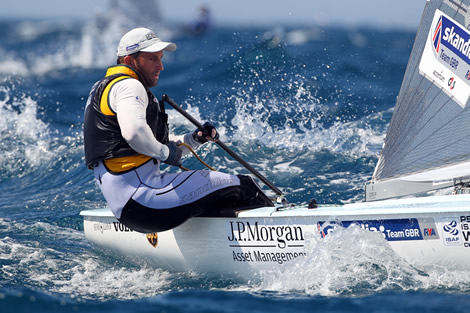
Ainslie outburst prompts need for regulation
To borrow the most over used cliché in offshore and ocean racing, the Perth 2011 ISAF Sailing World Championships have been a marathon not a sprint.
No doubt when we look back, after the excesses of Christmas, and it will feel like it flew by, but time has definitely dragged through the second week. It is hard not to conclude that Olympic classes sailing is in a bit of a mess.
Ben’s Bather’s Bay TV boat rage, and before that ‘shark watch’, may have woken up the media around the world to this global sailing showcase, but in many, many respects the regatta (recognition where its due to the sailing correspondent of The Australian who managed to bind both stories into one moment of high drama ‘The 34 year old leapt out of his Finn into Bather’s Bay not far from where a great white shark was sighted on Tuesday). But however exciting and competitive the racing has been it has served to highlight glaring problems.
 Stephen Park, RYA’s Olympic Manager, hits the nail on the head when he says (Olympic) sailing is ‘fumbling its way into making the sport more appealing for television’.
Stephen Park, RYA’s Olympic Manager, hits the nail on the head when he says (Olympic) sailing is ‘fumbling its way into making the sport more appealing for television’.
Ainslie’s case has been an incident waiting to happen. What is desperately unfortunate is that it cost Ben a world title and no one beyond Ainslie himself so far has shouldered any responsibility.
It is incredible enough that the need to present a cut and dried, first past the post wins, package for TV means that medal races created a rule that forego’s the athlete’s claim to redress, but at these World Championships that rule has been extended to include all races, not just medal races:
15.2. Actions by official boats or helicopters shall not be grounds for requesting redress by a boat. This changes RRS 62.
This is a belt and braces approach which is in place to avoid long subjective protests about whether an official boat has disturbed the wind or seas around a competitor, but its ramifications go further than the alleged influence on Ainslie’s performance. Consider more extreme cases and this rule is simply not acceptable.
Of course ISAF and the regatta organisers have a duty to provide fair, equable racing for the athletes but seemingly if they are compromised by an errant official or TV boat, that is just hard luck.
Latest discussions around the Fremantle Media Centre are what the TV footage which exists, and is owned by ISAF, will show when – if – it is finally released.
It may not conclusively show that Ainslie was impeded, but this incident was one of several. Two days previously words were exchanged from a more respectable distance. As it stands it seems most likely that RYA will hold a tribunal as per their statement released Monday, probably in early course, thereafter reporting back to ISAF. The question remains as to what further evidence is presented.
Stephen Park, RYA Olympic Manager, explained to us: “The RYA will consider whether they hold a tribunal. As it happens I think there will be a tribunal just to establish thoughts, but that does not necessarily mean they will impose any further penalty.”
Does he think another penalty merited? “I personally don’t, but I do perfectly understand that other people do.”
He explains: “From a team perspective of course we would far rather it did not occur. But equally from an RYA perspective we try to look after the sport. And we have always been careful that there is a Chinese wall between that activity (responsibilities to the sport) and the activities of the team. I think that is right and proper. That allows us to maintain our integrity within the organisation and within the team, rather than a situation you perhaps have in other countries.”
“There are two issues for me. There is little mitigation for climbing on board an official boat of a regatta and remonstrating with the people on board. Everyone accepts that. Ben accepts that and he is embarrassed it happened. And that part of it has to be dealt with. Everyone needs to understand that you can’t rant around.”
Park continues: “But then there is sorting out the issue. If Wayne Rooney is running up to kick the final goal in the world cup final and the television cameraman gets in the road and he trips over. You can see what is going to happen next!”
“The punishment has been pretty severe. But in the Tour de France when riders were knocked off by a media car (Spain’s Juan Antonio Flecha and Dutchman Johnny Hoogerland) then that was it. It was a case of ‘hand in your media pass and you are no longer welcome on the tour.’
“I am not necessarily saying that should have happened to the boat driver who was clearly directed, it is not just him.” He clarifies, “But the whole issue about how that is being managed needs to be addressed.
“None of that is mitigation for Ben’s actions, but people better equipped than me will decide what is appropriate and best for the sport. I will do my best as team manager to provide the appropriate information and support. But the second part is that we will use this as an opportunity for people to sit up and take some notice of what is going on with the sport and address it. Otherwise we are going to have more of these incidents continuing.
“As it happens I felt we already had similar issues where it was not just the sailing which had a bearing on the medal races on the Centre Course at the weekend.”
But these type of incidents have happened before, notably at Sail for Gold and here before? “We have voiced some of our concerns before, but we are not interested in having a fight. The situation is you want to play the game or not. If you want to play the game turn up, and if you don’t, you don’t. But the problem is that it continues to go further, and in different ways and is interpreted in different ways each time. So therefore people don’t know where the goalposts are.”
And the rule which specifically removes the athletes right to redress? “If we are going to end with situations where they are actively in the race course then you can’t have a rule like that.
We need to know how the TV should operate, but before they do that we need to outline what the goals of the programme are here. What are we trying to achieve? Once we know what it is and how that is going to work, everyone can buy into a solution. Right now I don’t think people are clear. I don’t think the solution is clear and that has not been communicated well to the teams and in turn to the individual competitors. The situation changes each time.”
Park is very right. The TV company involved are without question the best and most experienced operating globally at the moment. Their level of experience among their producers and directors is beyond reproach. But as other grand prix sailing circuits press ever forwards with stadium sailing – Extreme Sailing Series, RC44s, MedCup, America’s Cup World Series and the rest, so too it almost inevitable that the push for better, up close and personal images crosses into the Olympic arena. And of course light-weight dinghies are much susceptible to wash than big boat.
The offending pole mounted cam which was being used in Bather’s Bay when Ainslie erupted, has been widely used, occasionally irking competitors. But TV images are the very oxygen of these professional sailing circuits, and incidents are very quickly forgotten.
It stands to reason that a volunteer driver, albeit a very experienced sailor and accomplished driver, who was recommended by the organisation, should not be put under pressure of having a director and/or cameraman pressing him or her for better angles.
As a volunteer few would take their own initiative or make their own judgement as to when the line is crossed and a competitor is impinged. Suffice to say that for some time the TV company used the services of Mark Covell, Olympic silver medallist to drive in this role, and there were few complaints. As an aside, there are few Finn sailors who would fancy their chances against Covell, but the point is that drivers of his calibre are an added cost to the event. But in retrospect it is a cost which needs to be factored in to Olympic classes events of this calibre.
Park continues: “As I have said before and will repeat, trialling some new activities at the World Championships, which is the qualifier for 75% of the nations for the Olympic Games, it is like telling athletics ‘you know we usually have the 100 metres, we thought that people are really only getting into their strides at 90 metres, so we are going to make it 110 metres. And those who would like to, we would like you to carry a GoPro as well. We will try that and see how it goes. And here we are with sailors who have put years and years of their lives into winning a World Championships. We are fortunate here - and that is why I think a lot of the teams are happy for us to take a lead - because we are not here to seek Olympic qualification. In our case 7/10 of our events are already selected. But we have not spent a fortune to be here not to be able to do everything we can to win.
“I don’t think the issue is with the TV company. I think there needs to be a set of protocols which govern where and when the TV boat can go. These protocols exist in other sports. So why does sailing not take well documented versions and take some of that on board?”
In fact the Ainslie incident is just symptomatic of many of the frustrating failings which are riddled through Olympic classes racing and this event in particular. None of us are fans of more layers of bureaucracy and rules, but there needs to be universal protocols and guidelines adopted to guarantee an acceptably high level for athletes, media, volunteers, race officials. These exist in just about every major Olympic sport, but to paraphrase Park, sailing is fumbling through.
From a purely selfish media point of view, in order to operate at all, there needs to be a certain universal minimum standard of media boats, and drivers, separate boats for written press and photographers. At least one boat per course area. To arrive in Fremantle having spent a month’s salary on flights and accommodation to be sent out to watch a race in an 18ft dory with a bimini is not acceptable. As a basic function most written press nowadays want to file from the water. Similarly the media centre needs a protocol which guarantees desk space, the speed and bandwidth of the internet, separate networks for photographers. It needs a definitive, universal guarantee of efficient results delivered on paper as races finish.
These are purely personal requirements which have been a battle to achieve. But they are symptomatic of the failings elsewhere. Guidelines as to coachs’ access - or not - to the parts of the course area before, during and after races need a universal application.
And there are many worrying things looking forwards to the 2012 Olympic regatta. The tracking system and results set up by Swiss Timing still needs considerable streamlining. We understand there is still a debate to be settled whether it will be available at all during the Olympics as the Olympic rights holders consider they own rights to ‘moving images’ and the tracking constitutes moving images.
To be fair the TV output from these world championships has been a huge step up. Live streamed coverage of the Women’s Match Race final today was fantastic. But it does seem that on the ground here in Perth and Fremantle the reported £15m budget for the regatta could have been better spent in so many different areas. The regatta is spread over five sites and lacks a central focal point. There is a large exhibition park with over 250 free activities over the course of the 16 days here, a big wheel, many of the MNA’s took exhibition booths.
But there have never been more than a few hundred people in this park. Booth holders were told to expect over 250,000 visitors over the weekends and even at the back end of the event there have only been a few hundred. Several packed up and left during the first week. And clearly the organisers have worked hard and put a lot of money into the promotion to non-sailors, but the level of interest from elsewhere has been very, very low.
A whole street has been closed off in the centre of the Notre Dame university which is deemed the ‘Athletes Village’ but no one seems to have factored in that athletes don’t use a village which is half a mile or more from their dinghy park. Their routine is accommodation to dinghy park to accommodation to evening eating venue to bed. Repeat. Repeat. Repeat.
Sailing has never been under the same pressure to become more accessible, more popular, more exciting. And without doubt there has been some excellent work done here, but so too many of the Olympic sport’s failings have been once again highlighted here. It needs a clear vision, a clear strategy to get there, and a powerful individual or small team of people with the drive to make it work.











Latest Comments
seahorse 21/12/2011 - 13:43
I don't wish to knock the principle here, but it would be interesting to hear how many who are reading this article have actually watched any of the TV footage from Perth? Please enlighten me. Andrew223609 16/12/2011 - 16:16
Thanks for the interesting article. I wonder if catamarans for the tv cameras would help? Rowing had the same problem a few years ago of tv boats washing down competitors and solved it by switching to catamarans which produced much less wash.Add a comment - Members log in